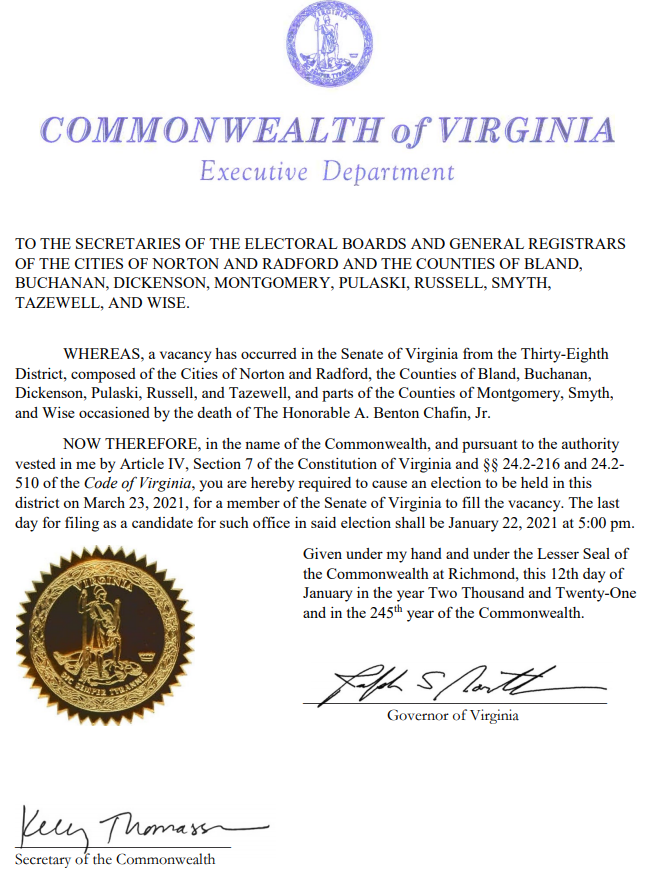
the governor schedules special elections for House of Delegates and State Senate seats, when vacancies occur and the General Assembly is not in session
Source: Governor of Virginia, writ of election (January 12, 2021)

the governor schedules special elections for House of Delegates and State Senate seats, when vacancies occur and the General Assembly is not in session
Source: Governor of Virginia, writ of election (January 12, 2021)
Not everyone elected to serve in the 40-member State Senate or 100-member House of Delegates will finish their term of office. Some will be elected to a different position. Members of the General Assembly can not hold two elected positions, and must resign their old seat in the General Assembly to assume a new office.
Some members will resign in order to be appointed to serve as a judge. Members occasionally quit due to ill health, and some die while in office.
Special elections are held to fill vacant positions in the General Assembly. Between 2004-2024, there was an average of three special elections each year.
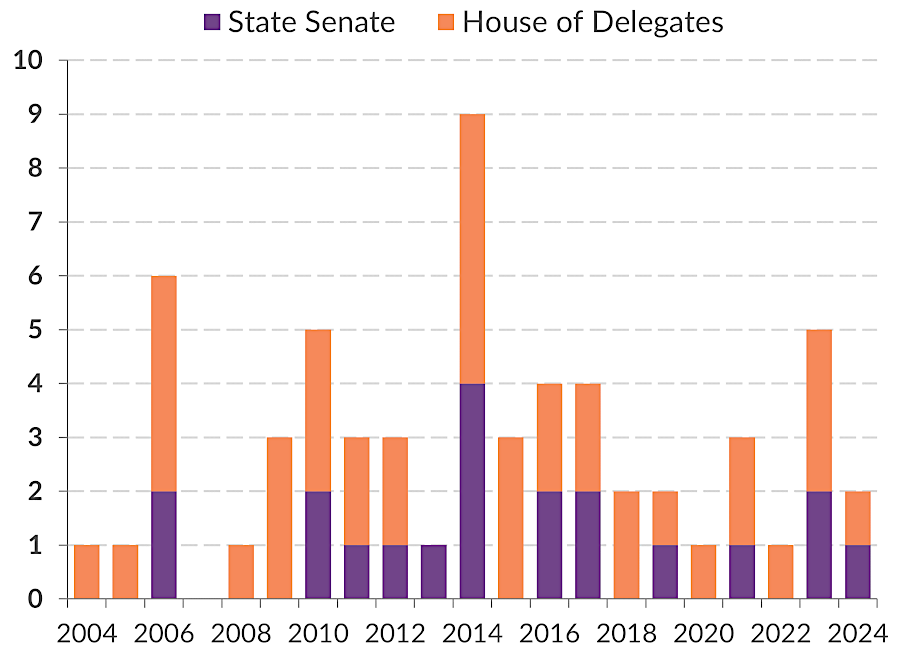
there were 60 special elections for General Assembly seats between 2004-2024
Source: Virginia Public Access Project (VPAP), Twenty Years of Special Elections
The governor of Virginia may appoint a replacement to fill a vacancy in the US Senate if the incumbent dies or resigns, but the Code of Virginia makes clear that the governor may not appoint anyone to fill a vacancy in the state legislature.
If a vacancy occurs while the General Assembly is not in session, the governor must issue a "writ of election" and voters in the district choose the replacement If the legislture is in session, the special election is scheduled by the Speaker of the House of Delegates or by the President pro tempore of the Senate:1
State law prohibits holding a special election within the 55 days prior to a general or primary election, or on the same day as a primary election. Special elections may be held on the same day as a general election. Localities must absorb the costs of special elections, but synchronizing them with already-scheduled general elections can eliminate that financial burden.
A special election for a General Assembly seat, held at the same time as the general election for members of the US House of Representatives in an even-numbered year, would allow a Delegate to serve in the General Assembly for a year. A State Senator could serve for three years, since those officials are elected every four years.
In 2020 the 29th District House of Delegates incumbent was chosen by the General Assembly to become a state judge. On the day he resigned, a member of the Winchester City Council immediately announced he was a candidate for the seat. The special election was scheduled for the same day as the 2020 general election. The winner was elected to serve the remainder of the term until December 31, 2021. His election created a vacancy on City Council in Winchester, triggering a temporary appointment by the City Council followed by a special election for that local office.2
The writ of election is delivered to the registrars in the jurisdictions within the election district. The notice of the election must be published for at least 10 days prior to the election.
The Code of Virginia states:3
The governor has a little flexibility in choosing dates for special elections for filling seats in the General Assembly. In late 2020, two members of the House of Delegates resigned. The delegate from the 90th District had been appointed as a state judge. The delegate from the 2nd District resigned in order to focus on her race for governor. Had she stayed in the House of Delegates, she would have been barred from fundraising during the general session in January-February, 2021 and any potential special session that might follow it.
Governor Ralph Northam quickly scheduled special elections to fill the two seats before the 2021 General Assembly met. Both members who resigned were Democrats, as was the governor. Had the seats stayed empty, the Democratic majority in the House of Delegates would have been narrowed to 53-45. As expected, two new Democrats won the special elections.
However, when a State Senator died just before the 30-day session started in January 2021, the Democratic governor chose to schedule that special election for the 38th District to occur in March, long after the end of the legislature's general session. The State Senator had been a Republican, and it was clear the Republican candidate would win the special election.
Leaving his seat empty created a brief 21-18 partisan balance in the State Senate. There were tie vote on several bills, including the legalization of marijuana and requiring local elections to be scheduled in November. Democratic Lieutenant Governor Justin Fairfax was able to cast tie-breaking votes, because Governor Northam had ensured one Republican seat would be vacant.
A frustrated Republican filed a lawsuit trying to force the governor to call for the special election at an earlier date, so the 38th Senatorial District would have representation for at least a portion of the session. The state judge ruled that the governor had met the requirements of the Code of Virginia:4
The significance of the empty seat was demonstrated just days after the judge's ruling. There was a tie vote, 19-19, on a bill to move all municipal elections to November. Of the 21 Democrats, 18 supported it, two opposed it, and one did not vote. Of the 18 Republicans, one supported the bill and 17 opposed it. That created a 19-19 tie, broken when the Lieutenant Governor voted in favor of the bill. Had the governor facilitated a quick election in the 38th Senatorial District, the initial vote could have been 19-20 and the bill would have failed.5
A rare attempt to recall a member of the General Assembly occurred in 2021. Conservative constituents of State Senator Louise Lucas (D-18) were angered by her support of Black Lives Matter protestors in June 2020, especially after they tore down a 56-foot tall Confederate monument in downtown Portsmouth. The city's police chief filed felony charges against Lucas. In the subsequent political battle the Commonwealth Attorney refused to prosecute, the police chief was fired, and Lucas retained her position as president pro tempore of the State Senate. She was the first black woman to hold that job. Her supporters claimed the recall advocates, led by the Virginia Tea Party, were motivated in part by racism.
Under Virginia law at the time, the recall advocates had to file a petition with the Circuit Court signed by at least 10% of number of voters in the last election for her State Senate seat. The recall advocates claimed they had 7,000 signatures, far exceeding the required number of 4,651. Since Sen. Lucas had not been convicted of a crime, the basis for the recall had to be "neglect of duty, misuse of office, or incompetence in the performance of duties."
The recall process in Virginia is different than in other states, where the process requires an election to determine if the official should be replaced. The Circuit Court judge is empowered to remove some elected officials, or to allow them to stay in office. The petitioners wanted the judge, who had been appointed by the General Assembly, to remove a State Senator for "misuse of office" and call a special election to fill her incomplete term. No Virginia judge has ever been asked to determine that a member of the General Assembly was unfit to remain in office, or to replace the judgement of the voters who participated in the last election with the judgement of a single appointed judge.6
Lawyers for State Senator Lucas argued that the recall procedures in state law did not apply to members of the General Assembly, since the state constitution had specific provisions for removing state legislators from office. Through a vote of two-thirds of the members, the State Senate can expel members. The lawyers stated:7
A judge agreed with the lawyers of State Senator Lucas and quickly dismissed the recall petition:8
Also in 2021, the member of the House of Delegates 89th District won re-election in November and resigned his seat in December. Del. Jay Jones had lost his race earlier in the year for the Democratic nomination for Attorney General, but easily won re-election to the House. Del. Jones was a well-respected leader in the Democratic Party and his resignation caught people by surprise. He said he was resigning after discovering that he was going to become a father. However, after Republicans won 52 of the 100 seats in the House of Delegates in November, 2021, Del. Jones would have been a member of the minority party in 2022.
Because the General Assembly was technically in session and Democrats were in the majority, House Speaker Eileen Filler-Corn rather than Governor Northam was responsible for setting the date for a special election. She quickly issued a writ for January 11, the day before the General Assembly would meet. The presumption was that the heavily Democratic district would elect a Democrat, ensuring 48 members of that party for most of the regular session of the 2022 General Assembly. The district boundaries for the special election were not altered to reflect the redistricting required after the 2020 Census, because the Virginia Supreme Court had not yet adopted new maps.
Just 488 voters participated in the firehouse primary that selected the Democratic candidate to run in the special election for the 89th District. In the January 11, 2022 special election, the Democratic candidate won by 3,956-1,300 votes, with 11 write-in votes for other candidates. By way of comparison, almost 22,000 voters had cast ballots when Del. Jay Jones won the November 2021 election by a 17,450-4,340 margin.9
That quick call for an election in the 89th District led to a State Senator filing a bill for the 2022 General Assembly that would require elections be scheduled within 30 days, if a vacancy in the General Assembly occurred between December 10 and March 1.
At the time, a Republican governor was about to be inaugurated and control of the House of Delegates was switching to the Republicans. Democrats in the General Assembly were faced with the possibility that the scheduling games which had benefitted their party in recent years might become a problem when Republicans had the power to schedule special elections.
Political scientist Stephen J. Farnsworth at the University of Mary Washington suggested legislators might support such a bill independent of their short-term partisan interests. The legislature is an independent legislative body with a long-term institutional rivalry with the Executive Branch, and may not want the governor to control when legislators will be replaced:10
In the November 2022 elections, Republican State Senator Jen Kiggans won election to the US House of Representatives. That required scheduling a special election to replace her. At the time, there were 21 Democrats and 19 Republicans in the State Senate, and Governor Glenn Youngkin was a Republican. One Democrat was a potential supporter of adding restrictions to abortion access that Republicans were seeking. If there was a 20-20 vote on that issue, Lieutenant Governor Winsome Earle-Sears - also a Republican - would break the tie.
It was unclear if the General Assembly was in session, since the House of Delegates had adjourned and the State Senate had not, so it was unclear if the governor could schedule the special election. If the General Assembly was still in session, then President pro tempore State Senator Louise Lucas - a Democrat - had the authority. If she chose to act as a partisan Democrat, she could delay the election so her party would have a 21-18 majority during much of the 2023 session of the General Assembly.
The two leaders solved the dilemma by issuing a joint call for a special election. Both issued writs of election for a January 10, 2023 election.11
The 2023 General Assembly revised the Code of Virginia and set a 30-day deadline for the Governor to call a special election to fill a vacancy in the state legislature. The same deadline to issue a writ of election was imposed on the Speaker of the House of Delegates and the President pro tempore of the Senate, if the vacancy occurred while the General Assembly was in session:12
On December 12, 2023, the delegate who had been elected for House District 48 less than five weeks earlier announced that he was resigning on January 9, 2024. The Governor then called for an election on January 9, the earliest possible date. The 2024 General Assembly meeting started on January 10, so after certification of the election the new member could serve for nearly the entire 60-day session.13
The Republican Party's 48th District Legislative Committee determined the nomination process for the candidate, and in that district the Republican nomination was tantamount to election. The two members of that committee, one representing Pittsylvania County and the other representing Henry County, ended up being the two candidates for the House of Delegates seat. Rather than vote themselves, each appointed a representative to decide on the nomination process.
The decision to hold a mass meeting was not controversial, but the two candidates disagreed on the final time and place. Because Pittsylvania County had a larger population, the vote was weighted and that county's representative made the final decision.
The chosen location was the Old Dominion Agricultural Center in Chatham, the county seat of Pittsylvania County. That location was 30 miles from Henry County. The time and location made it relatively easy for Pittsylvania County Republicans to attend, while making it logistically challenging for Henry County Republicans to get to the mass meeting after their work day ended:
A member of the House of Delegates from Patrick County, who supported the Henry County candidate, claimed the Chatham County candidate had rigged the nomination process unfairly:14
The Henry County candidate still managed to win the nomination. His election on January 9, 2024 would put the first person from Henry County in the General Assembly since 2012.15
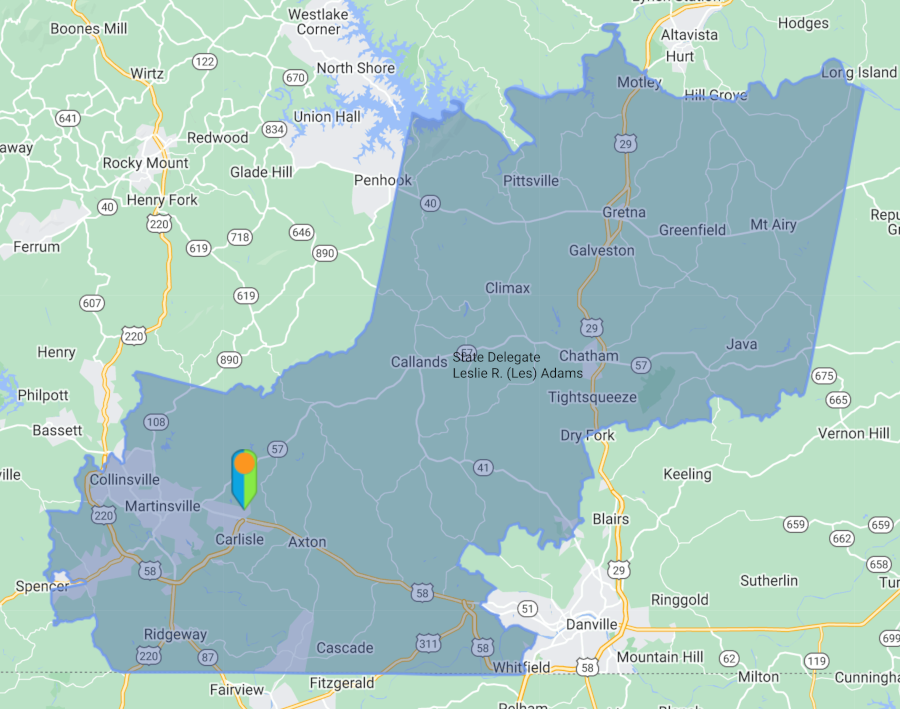
Henry County and Pittsylvania County Republicans contested to nominate a candidate in the 48th District, after Del. Les Adams resigned
Source: Virginia General Assembly, Who's My Lgislator?
Governor Youngkin also called for a January 9 election for the 9th Senate District seat, after State Senator Frank Ruff announced that he too would resign before the 2024 General Session started. Following the 2023 election, he was diagnosed with a spreading cancer that required chemotherapy and concluded his treatment would impact his ability to serve. He chose to resign because:16
The Governor rather than the President pro tempore of the State Senate was able to schedule the election because that legislative body had finally adjourned the two special legislative sessions started in 2022 and 2023. The Democratically-controlled State Senate had stayed in session to block the Governor from making appointments to fill vacancies on the State Corporation Commission.
Both the 48th House of Delegates and the 9th Senate districts were in heavily Republican districts and both resigning legislators were Republicans, so the partisan balance in the General Assembly would not be affected by the special elections. For a brief moment, the Democrats would have a slightly larger majority in both houses because the winners of the January 9 elections would not be sworn in when the General Assembly started a day later.
The elections had to be certified first by the Virgina Department of Elections. The House of Delegates startd on January 10, 2024 with 51 Democrats and 48 Republicans, and the State Senate started with 21 Democrats and 18 Republicans. The Clerk of the State Senate noted:17
State Senator Frank Ruff timed his resignation, announced on December 15, 2023, so his preferred successor would get a head start on the special election.
The filing date with the Virginia Department of Elections to appear on the January 9, 2024 ballot was December 20, 2023. In the 9th District for the State Senate, nomination by the Republican Party was tantamount to election. The Republican caucus to select a candidate was scheduled for December 19, providing very limited time for candidates to organize support.
The timing of Sen. Ruff's resignation caught most people by surprise. However, he alerted in advance his former legislative aide, Tammy Mulchi. He also notified the leader of the Virginia Hunting Dog Alliance, a key constituency in his district, and arranged for them to support Tammy Mulchi.
Six candidates ran for the Republican nomination. The caucus was held on a night when temperatures dropped below freezing. With 800 people attending at the start, voting tables were outdoors at the Drakes Branch Volunteer Fire Department in Charlotte County.
By the fourth ballot, six hours after the caucus started, about half the attendees had left. Those remaining included hunters dressed for the cold. Tammy Mulchi won by 278-226, and the leader of the Virginia Hunting Dog Alliance estimated that 85% of her support came from the hunters who had stayed to vote in the fourth round.
Sen. Ruff timing his resignation to facilitate Tammie Mulchi's election was not a new technique. State Senator Ralph Smith timed announcement of his resignation in 2015 so there would be less than two days for a candidate to qualify for nomination by the Republican convention. That timing ensured his legislative aide would become his replacement.18
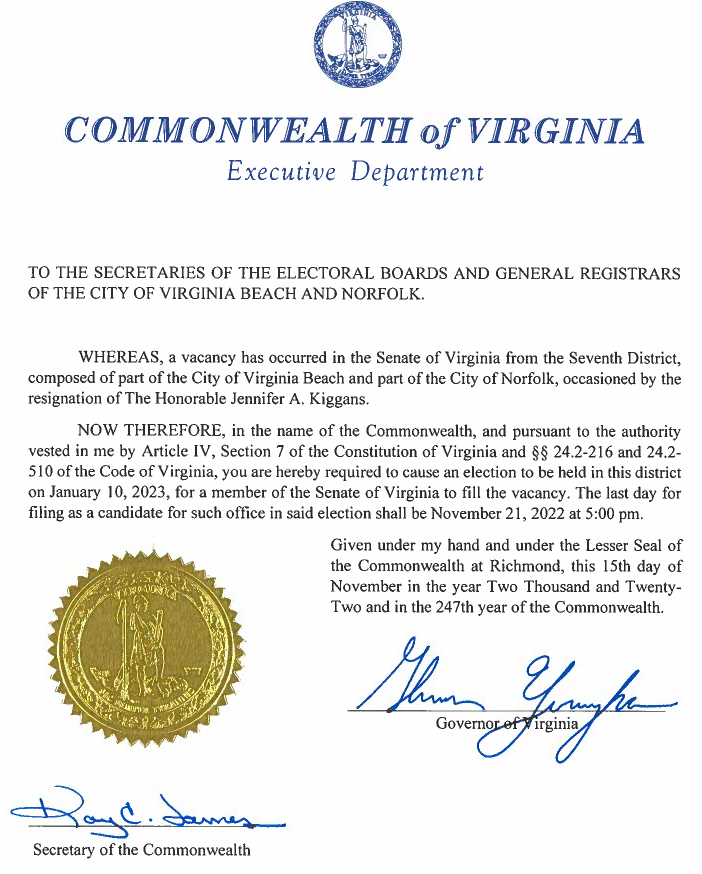
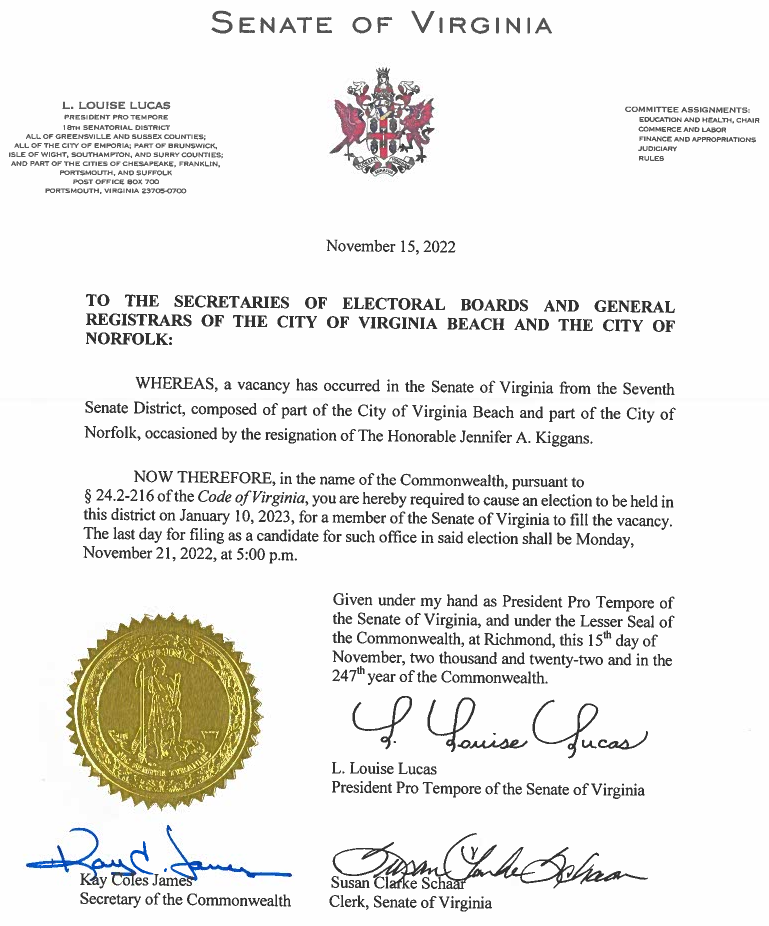
both the governor and the President pro tempore of the State Senate issued writs for a special election on January 10, 2023
Source: Governor of Virginia, writ of election and Senate of Virginia, writ of election